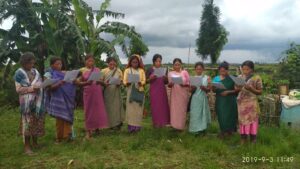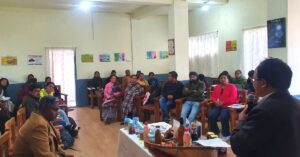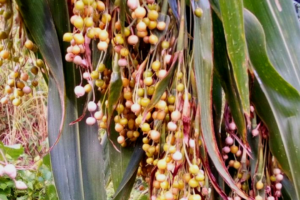
It unveils an assessment using FAO’s Tool for Agroecology Performance Evaluation (TAPE), together with a creative storytelling approach, to provide evidence of the benefits of Indigenous Peoples Food Systems (IPFS) for people, nature and climate. It’s basis is the field study of 500 households across four countries and three continents in 16 landscapes through the TAPE methodology
On 10 October 2024, the 2024 Rome Gathering on the assessment of Indigenous Peoples’ Food Systems was held at UN-IFAD Headquarters in Rome which was graced by The President of IFAD, Alvaro Lario and moderated by Phrang Roy, Coordinator of The Indigenous Partnership for Agrobiodiversity and Food Sovereignty (TIP).
In his opening remarks, Alvaro Lario shared, “We are all aware that food systems are in a breaking point, they are already not sustainable, not resilient. I do believe that IPFS are very much grounded from the traditional knowledge that aligns with protecting people but also the planet and aligns to the rhythm of nature and the needs of nature.”
The event also featured a distinguished gathering, including Ambassadors and Permanent Representatives to Rome UN Agencies from India, Mexico, Canada, and Finland, the Chair of the UN Permanent Forum on Indigenous Issues, the Director of School Meals and Social Protection Services at the World Food Program (WFP),the Director of Food Systems of The Nature Conservancy (TNC), New York and Representatives of Global Networks such as the School Meals Coalition, Agroecology Coalition and REGEN10 among other dignitaries. The delegation from North East India included Dhrupad Choudhury, Ecologist, Indigenous Food Systems Expert, and TIP’s Advisor, Pius Ranee, Executive Director, NESFAS, George B. Lyngdoh, Senior Consultant, Livelihoods, NESFAS and Gratia E Dkhar, Senior Associate, NESFAS and Coordinator of the TAPE study.
The assessment of Indigenous Peoples Food Systems with 500 households across 4 countries was carried out essentially by young Indigenous Peoples professionals and coordinated by Gratia Dkhar of NESFAS. It was a remarkable demonstration that committed and trained Indigenous Peoples Youth can lead complex studies. They were strongly supported by a technical team from the Food and Agriculture Organization (FAO), Universities in Thailand and Mexico and senior TIP experts all of whom have deep understanding of the food systems of the Khasi, Garo and Karbi Peoples of Meghalaya, India, the Yucatec Mayans of Mexico, the Karen of Northern Thailand and the Ogiek Peoples of Kenya. These experts were able to suggest strategic fine tuning of international survey methodologies to fully capture the nuances of Indigenous Peoples Food Systems.
In her presentation of the final results of the Survey that emerged from the statistical analysis by FAO, Ms. Gratia Dkhar and her team highlighted that most of the Indigenous Peoples Food Systems performed very well in promoting diversity, synergies, efficiency, recycling, cultural and social values of caring and sharing, promotion of circular economies and responsible governance. The Studies also found that these food systems have the potential to build dietary diversity, soil health and women and youth empowerment. Ms. Gratia Dkhar also said that the Study also highlighted the neglect by Research of rainfed agriculture. She further stated that all too often, policies, by a lack of appreciation and understanding that these food systems are more than just agriculture, are in fact losing an opportunity to move to more nature-based food systems that will benefit people, nature and climate resilience. This statistically based study was also complemented by a participatory storytelling approach where 30 stories were gathered from these 4 countries. These stories further clarified that Indigenous Peoples food systems are bio-centric as they are all designed for all life. They are rooted in the locality and the local people, they blend traditional and new innovations, they are driven by caring and sharing values as part of their traditional governance systems. Their resilience grows by nurturing nature rather than protecting it from people.
These results of the Study were shared with all the 500 households who together with TIP and its professional partners (Dr. Dhrupad Choudhury, Dr. Francisco Rosado May and Mr. Phrang Roy, Mr. Pius Ranee and Ms. Anna Bruni) developed an Outcome Framework which highlights that Indigenous Peoples Food Systems can benefit people, nature and climate through 4 pillars of promoting biodiversity, nutritious food for all especially through community led School Meals programmes, green livelihoods that Indigenous Food systems have the potential to generate and to build climate resilience. The TIP Team after consulting communities has developed possible pathways and likely indicators of outcomes based on co-creation of knowledge and initiatives.
In his presentation of the Outcome Framework, Dhrupad Choudhury stressed the importance of biodiversity protection, nutrition enhancement through crop diversity, community resilience, and climate change adaptation through knowledge co-creation. “Scientific knowledge is experimental but if we look at indigenous knowledge, it is experiential and empirical. As such, there is an element of eliminating knowledge or practice that does not work. There is an urgent need, therefore, for the two (indigenous and scientific) to come together and work on equal terms for co-creation of knowledge and solutions.” He added.
An Outcome Framework was developed which highlights that Indigenous Peoples Food Systems can benefit people, nature and climate through 4 pillars of promoting biodiversity, nutritious food for all especially through community led School Meals programmes, green livelihoods that Indigenous Food systems have the potential to generate and to build climate resilience. The TIP Team after consulting communities has developed possible pathways and likely indicators of outcomes based on co-creation of knowledge and initiatives.
In his presentation of the Outcome Framework, Dhrupad Choudhury stressed the importance of biodiversity protection, nutrition enhancement through crop diversity, community resilience, and climate change adaptation through knowledge co-creation. “Scientific knowledge is experimental but if we look at indigenous knowledge, it is experiential and empirical. As such, there is an element of eliminating knowledge or practice that does not work. There is an urgent need, therefore, for the two (indigenous and scientific) to come together and work on equal terms for co-creation of knowledge and solutions.” He added.
Francisco J. Rosado May, an Agroecology and Intercultural Knowledge Specialist from Mexico, in his presentation highlighted the high potential of Indigenous knowledge to contribute to the transformation of broken food systems worldwide. “In this regard, TAPE has allowed us to think on how best to move forward in the process of co-creation of knowledge, opening safe spaces for different ways of science and indigenous knowledge to work together,” he commented.
Following the presentations, a short session was opened to experts in the IPFS sector for sharing their experiences and comments on how to scale Indigenous Peoples’ Food Systems.
Ilaria Firmian, Senior Technical Adviser, Indigenous Peoples, IFAD, agreed that solutions for scaling up IPFS lay in increasing food and nutrition security and income generation.
The Head of the Indigenous Peoples Unit of FAO, Yon Fernandez-de-Larrinao also stressed the importance of a biocentric approach to land and forest restoration that recognises Indigenous Peoples as knowledge holders. He said that putting Indigenous Peoples at the center of the restoration of degraded land and food systems is the way forward for scaling up Indigenous Peoples Food Systems.
Ms. Alejandra Pero, Global Indigenous Peoples Advisor of WFP, shared insights on School Meals for Indigenous Peoples children in the Latin America and Caribbean Region and highlighted that the School Meal Programme is making a significant difference.
Summarising the exhortations of The President of IFAD, the Chair of the UN Permanent Forum on Indigenous Issues, the Ambassador of Canada to the Rome UN Agencies, the Permanent Representative of Finland to the Rome UN Agencies, the Director of the Global School Meals Coalition and the Ambassador of Mexico to the Rome UN Agencies, Mr. Phrang Roy wrapped up the deliberations of the Gathering by reemphasising the importance of looking to food systems for social justice especially with regards to rights and identity, building local templates of solutions, sharing understanding for co-creation of knowledge between traditional systems and contemporary science as equal partners, promoting proactive actions by Indigenous Peoples themselves, supporting School Meals Programmes especially those initiated locally. He further concluded that even in the management of food systems, social values must play a concrete role for governance and there is a need to build a cadre of trained young people through flexible funding mechanisms. He also highlighted the importance of recognising the landscape approach of Indigenous Peoples across the world.
Following the above sessions a reception with indigenous peoples’ inspired finger food was hosted. Its was tastefully created by Chef Thomas Zacharias of “The Locavore”, Mumbai, who was a chef in a Michelin Star restaurant in New York.



